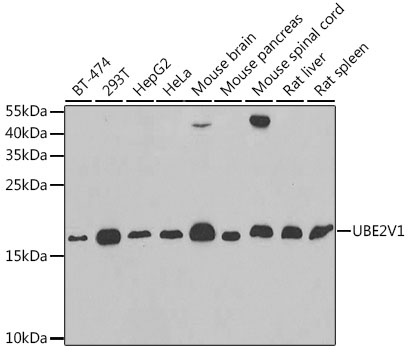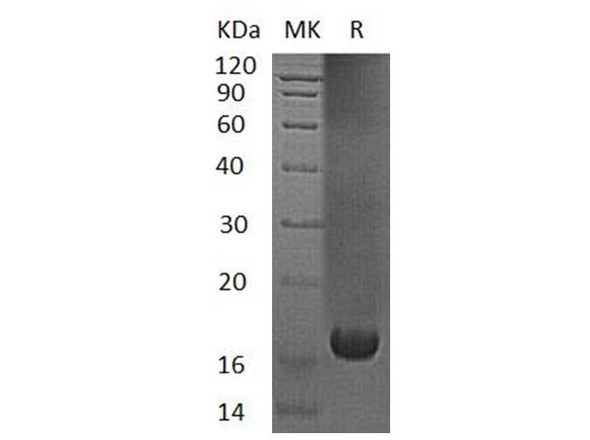Signal Transduction Antibodies 3
Anti-UBE2V1 Antibody (CAB6316)
- SKU:
- CAB6316
- Product Type:
- Antibody
- Reactivity:
- Human
- Reactivity:
- Mouse
- Reactivity:
- Rat
- Host Species:
- Rabbit
- Isotype:
- IgG
- Antibody Type:
- Polyclonal Antibody
- Research Area:
- Signal Transduction
Description
| Antibody Name: | Anti-UBE2V1 Antibody |
| Antibody SKU: | CAB6316 |
| Antibody Size: | 20uL, 50uL, 100uL |
| Application: | WB |
| Reactivity: | Human, Mouse, Rat |
| Host Species: | Rabbit |
| Immunogen: | Recombinant fusion protein containing a sequence corresponding to amino acids 1-147 of human UBE2V1 (NP_001027459.1). |
| Application: | WB |
| Recommended Dilution: | WB 1:500 - 1:2000 |
| Reactivity: | Human, Mouse, Rat |
| Positive Samples: | BT-474, 293T, HepG2, HeLa, Mouse brain, Mouse pancreas, Mouse spinal cord, Rat liver, Rat spleen |
| Immunogen: | Recombinant fusion protein containing a sequence corresponding to amino acids 1-147 of human UBE2V1 (NP_001027459.1). |
| Purification Method: | Affinity purification |
| Storage Buffer: | Store at -20'C. Avoid freeze / thaw cycles. Buffer: PBS with 0.02% sodium azide, 50% glycerol, pH7.3. |
| Isotype: | IgG |
| Sequence: | MAAT TGSG VKVP RNFR LLEE LEEG QKGV GDGT VSWG LEDD EDMT LTRW TGMI IGPP RTIY ENRI YSLK IECG PKYP EAPP FVRF VTKI NMNG VNSS NGVV DPRA ISVL AKWQ NSYS IKVV LQEL RRLM MSKE NMKL PQPP EGQC YSN |
| Gene ID: | 7335 |
| Uniprot: | Q13404 |
| Cellular Location: | Nucleus |
| Calculated MW: | 11kDa/16kDa/19kDa/25kDa |
| Observed MW: | 16kDa |
| Synonyms: | UBE2V1, CIR1, CROC-1, CROC1, UBE2V, UEV-1, UEV1, UEV1A |
| Background: | Ubiquitin-conjugating E2 enzyme variant proteins constitute a distinct subfamily within the E2 protein family. They have sequence similarity to other ubiquitin-conjugating enzymes but lack the conserved cysteine residue that is critical for the catalytic activity of E2s. The protein encoded by this gene is located in the nucleus and can cause transcriptional activation of the human FOS proto-oncogene. It is thought to be involved in the control of differentiation by altering cell cycle behavior. Alternatively spliced transcript variants encoding multiple isoforms have been described for this gene, and multiple pseudogenes of this gene have been identified. Co-transcription of this gene and the neighboring upstream gene generates a rare transcript (Kua-UEV), which encodes a fusion protein comprised of sequence sharing identity with each individual gene product. |
| UniProt Protein Function: | UBE2V1: Has no ubiquitin ligase activity on its own. The UBE2V1- UBE2N heterodimer catalyzes the synthesis of non-canonical poly- ubiquitin chains that are linked through Lys-63. This type of poly-ubiquitination activates IKK and does not seem to involve protein degradation by the proteasome. Plays a role in the activation of NF-kappa-B mediated by IL1B, TNF, TRAF6 and TRAF2. Mediates transcriptional activation of target genes. Plays a role in the control of progress through the cell cycle and differentiation. Plays a role in the error-free DNA repair pathway and contributes to the survival of cells after DNA damage. Belongs to the ubiquitin-conjugating enzyme family. 5 isoforms of the human protein are produced by alternative splicing. |
| UniProt Protein Details: | Protein type:Ubiquitin conjugating system Chromosomal Location of Human Ortholog: 20q13.2 Cellular Component: protein complex; ubiquitin conjugating enzyme complex; cytoplasm; nucleus; cytosol; ubiquitin ligase complex Molecular Function:protein binding; small conjugating protein ligase activity; ubiquitin conjugating enzyme binding; ubiquitin protein ligase binding Biological Process: protein polyubiquitination; positive regulation of I-kappaB kinase/NF-kappaB cascade; error-free postreplication DNA repair; postreplication repair; positive regulation of transcription, DNA-dependent; T cell receptor signaling pathway; toll-like receptor 2 signaling pathway; activation of NF-kappaB transcription factor; toll-like receptor 10 signaling pathway; MyD88-dependent toll-like receptor signaling pathway; toll-like receptor 5 signaling pathway; regulation of DNA repair; regulation of transcription, DNA-dependent; toll-like receptor signaling pathway; innate immune response; toll-like receptor 9 signaling pathway; cell differentiation; toll-like receptor 4 signaling pathway |
| NCBI Summary: | Ubiquitin-conjugating E2 enzyme variant proteins constitute a distinct subfamily within the E2 protein family. They have sequence similarity to other ubiquitin-conjugating enzymes but lack the conserved cysteine residue that is critical for the catalytic activity of E2s. The protein encoded by this gene is located in the nucleus and can cause transcriptional activation of the human FOS proto-oncogene. It is thought to be involved in the control of differentiation by altering cell cycle behavior. Alternatively spliced transcript variants encoding multiple isoforms have been described for this gene, and multiple pseudogenes of this gene have been identified. Co-transcription of this gene and the neighboring upstream gene generates a rare transcript (Kua-UEV), which encodes a fusion protein comprised of sequence sharing identity with each individual gene product. [provided by RefSeq, Apr 2012] |
| UniProt Code: | Q13404 |
| NCBI GenInfo Identifier: | 259016163 |
| NCBI Gene ID: | 7335 |
| NCBI Accession: | Q13404.2 |
| UniProt Secondary Accession: | Q13404,Q13403, Q13532, Q5TGE0, Q5TGE3, Q96H34, Q9GZT0 Q9GZW1, Q9H4J3, Q9H4J4, Q9UKL1, E1P629, |
| UniProt Related Accession: | Q13404 |
| Molecular Weight: | 147 |
| NCBI Full Name: | Ubiquitin-conjugating enzyme E2 variant 1 |
| NCBI Synonym Full Names: | ubiquitin-conjugating enzyme E2 variant 1 |
| NCBI Official Symbol: | UBE2V1 |
| NCBI Official Synonym Symbols: | CIR1; UEV1; CROC1; UBE2V; UEV-1; UEV1A; CROC-1 |
| NCBI Protein Information: | ubiquitin-conjugating enzyme E2 variant 1; DNA-binding protein; TRAF6-regulated IKK activator 1 beta Uev1A |
| UniProt Protein Name: | Ubiquitin-conjugating enzyme E2 variant 1 |
| UniProt Synonym Protein Names: | CROC-1; TRAF6-regulated IKK activator 1 beta Uev1A |
| UniProt Gene Name: | UBE2V1 |
| UniProt Entry Name: | UB2V1_HUMAN |







